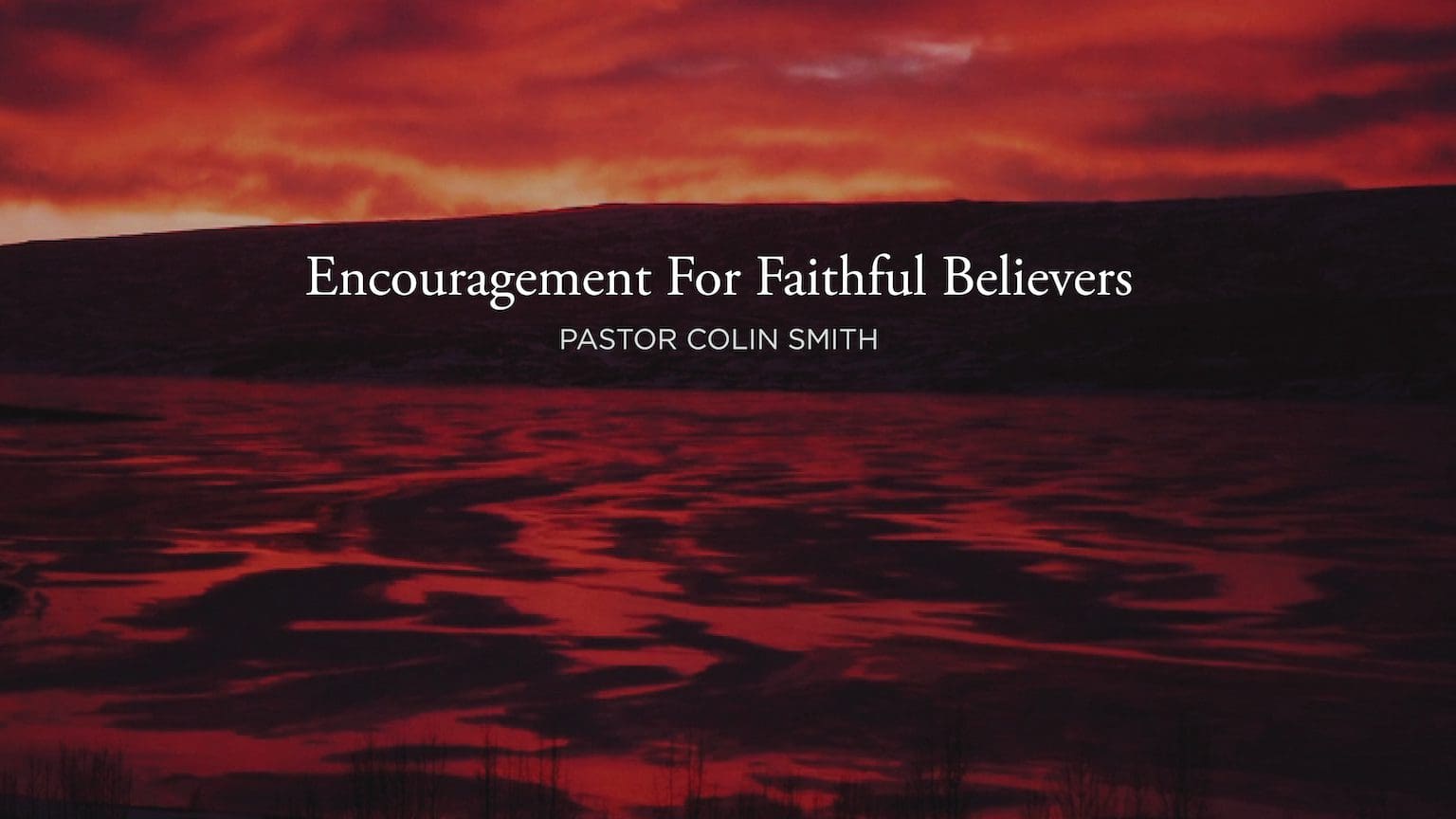Please open your Bible at the last book of the Old Testament, Malachi 3:16.
We saw last time that the book of Malachi speaks directly to us today. Believers in Malachi’s day faced the challenges of disappointment with leaders, disruption to worship, and a growing coldness of heart toward God.
But through all of this, there were some who remained faithful. Malachi describes them as those who feared the Lord (vs. 16). And he tells us what they did: Then those who feared the LORD spoke with one another.
When faithful believers feel the chill winds of growing skepticism and unbelief around then, they move closer to one another. They speak with one another – often.
We saw the principle, beautifully illustrated on the Road to Emmaus, that when faithful believers talked together about Jesus, Jesus Himself drew near and walked with them (Lk 24:15). You will find the presence of Jesus in the company of other believers.
When we face what faithful believers in Malachi’s day faced, we must do what faithful believers in Malachi’s day did. We must speak with one another.
Malachi tells us, Then those who feared the LORD spoke with one another. The LORD paid attention and heard them (Mal 3:16).
I’ve called this series “Encouragement for Faithful Believers.” And the first encouragement is that God hears. Today we come to the second encouragement which is that God remembers.
We begin today at v13 where God says to His people, Your words have been hard against me, says the LORD…You have said, “It is vain to serve God” (Mal 3:13-14).
If you extend yourself in serving the Lord, you may come to a time when you are discouraged, you feel defeated, and you realize that you are losing the will to carry on.
The work you once counted a privilege, now seems like a liability. You find yourself asking “why am I carrying this burden? What am I getting out of this? And in your darker moments you may be tempted to say, “it is vain to serve the Lord.”
Asaph, a godly man, struggled with this. He pursued a holy life, but there came a time when in his own private thoughts, he reckoned, In vain have I kept my heart clean (Psalm 73:13). I have tied to live a life that honors the Lord, but what have I gained? Why am I doing this? In vain I have kept my heart clean.
Now if you read the rest of Psalm 73, you will see how Asaph answered these dark thoughts, but what I want you see right now is that he had them. This faithful believer knew what it was to feel that pursuing a godly life might be in vain.
Job faced the same struggle. We saw last time that He was commended for speaking well of God (Job 42:7). But Job struggled with some very dark thoughts. At one point, he asked, Why do I labor in vain? (Job 9:29).
And there were times when the apostle Paul feared that his work might be in vain. Writing to the Galatians, he says I am afraid that I may have labored over you in vain (Gal 4:11).
If you have are tempted to feel that your work, your service, your ministry, your faithfulness has been wasted, Malachi chapter 3 is for you. Because right here, God answers the charge the serving Him is vain.
Then those who feared the LORD spoke with one another. The LORD paid attention and heard them, and a book of remembrance was written before him of those who feared the LORD and esteemed his name (Mal 3:16).
God knows all things and He does not need books to remind Him of what we have done. But God speaks in a way that we can understand, and here Malachi tells us that God will never forget what those who fear Him have done.
When we read of a book written before God, our first thought may be of the “book of life” that is spoken of repeatedly in the Bible. Paul speaks of those whom he calls my fellow workers, whose names are in the book of life (Phil 4:3).
Jesus says to His disciples, rejoice that your names are written in heaven (Lk 10:20).
In the book of Revelation we are told that nothing unclean will ever enter God’s new creation but only those who are written in the Lamb’s book of life (Rev 21:27).
The book of life belongs to Jesus Christ. It is “the Lamb’s” book of life. Jesus Christ is the Lamb of God who takes away the sins of the world. He gives eternal life (Jn 5:21, 10:28).
The names written in the book of life are the names of those who believe. It is by believing that we have life in His name (Jn 20:31).
It is a marvelous thing to know that your name is written in the Lamb’s book of life. God says to His people, Fear not for I have redeemed you; I have called you by name, you are mine (Isa 43:1).
This Lamb’s book of life was written “before the foundation of the world” (Rev 13:8). God knows those who are His (2 Tim 2:19). He always has. He always will. And He will never forget His own.
The book of life is a wonderful theme in the Bible, but I don’t think that Malachi is speaking about the book of life. He says “a book of remembrance was written before the Lord.” And we are told about this book of remembrance in response to the fear that God’s people may serve Him in vain.
Dr Walt Kaiser says, “Here we see something similar to the Persian custom of entering into a book all acts that should be awarded in the future.”1 There is a fascinating reference to this in the book of Esther, that comes from the same time as the books of Nehemiah and Malachi.
Esther, who in God’s providence had become queen in the royal court of King Ahasuerus, had a cousin by the name of Mordecai. Mordecai was a good friend and a wise counselor to Esther and he made it his business to hang around the palace.
One day when he was sitting at the King’s gate, Mordecai overheard two of the king’s security guards plotting to take his life. Mordecai told Esther, Esther told the king. The plot was foiled and the king’s life was saved.
Some time later, there was a night when the king could not sleep. On that night the king could not sleep. And he gave orders to bring the book of memorable deeds, the chronicles, and they were read before the king (Esther 6:1). When the book was read, it was found that Mordecai had given the intelligence that foiled the plot on the king’s life. So, the king asked, What honor… has been bestowed on Mordecai for this? And he was told “nothing has been done for him” (Esther 6:3).
So, the king commanded that Mordecai should be honored because what he did was written in the book of memorable deeds.
The point here is that the king had a book of remembrance: a book where honorable deeds were recorded. And Malachi tells us that God has a “book of remembrance.” So, when you are tempted to think that perhaps your service for God is in vain, you need to know that God remembers what you have done. A book of remembrance was written before the Lord.
What does God remember?
1. God Remembers Your Work
For God is not unjust so as to overlook your work and the love that you have shown for his name in serving the saints, as you still do (Hebrews 6:10). Perhaps you feel that no one cares about what you do. Who sees what you are doing? Who knows the care you are putting into it? God sees what you are doing, and He will not overlook your work. This theme is repeated in the words of Jesus to the churches in the book of Revelation.
God knows your work. I know your works, your toil and your patient endurance (Rev 2:2). God knows the difficulty of your work. I know your tribulation and your poverty (Rev 2:9). I know where you dwell (Rev 2:13). God knows all that goes into your work. I know your works, your love and faith and service and patient endurance (Rev 2:19).
Your work may never attract the praise or attention of others. It may be largely hidden from view. But God knows your work. It is written in His book of remembrance.
2. God Remembers Your Words
Then those who feared the LORD spoke with one another. The LORD paid attention and heard them, and a book of remembrance was written before him of those who feared the LORD and esteemed his name (Mal 3:16). The book of remembrance was written before the Lord when God’s people spoke with one another. When those who esteemed the Lord spoke together, the Lord paid attention and heard them.
We know that God hears us when we speak to Him. But that is not what is said here. It does not say that those who feared the Lord cried out to Him, and the Lord heard them. It says, those who feared the Lord spoke with one another and the Lord heard them.
God hears what we say to each other, and when you speak with faith, hope, and love, when you speak with courage, when you speak in a way that honors the Lord, God hears and He remembers.
3. God Remembers Your Tears
You have kept count of my tossings; put my tears in your bottle. Are they not in your book? (Ps56:8). God knows your highest hopes and your deepest fears, and on a night when you cannot sleep He knows every time you turn in your bed.
And God knows every tear that has ever rolled down your face. They are all in God’s book of remembrance.
Perhaps you have endured something that no one else can understand. Other people don’t know the trouble that is in your heart. You shed your tears in secret, but God knows the pain that you carry and He remembers your tears.
4. God Remembers Your Desires
O Lord, all my longing is before you; my sighing is not hidden from you (Ps 38:9). One of the things you soon discover in the Christian life is that your desire exceeds your reach. You want to be more godly than you are. You want to accomplish more than you do.
Paul says, I want to know Christ, and the power of His resurrection….Not that I have already obtained this… but I press on. (Phil 3:10-12) God knows what you want to be, even though you haven’t got there yet.
And God knows what you want to do: This is a wonderful encouragement when you are disappointed. There was something good you wanted to do, but the door closed. Or perhaps it never opened and you live with a sense of disappointment.
Solomon tells us that the LORD said to his father David, Whereas it was in your heart to build a house for my name, you did well that it was in your heart (1 Kings 8:18). David didn’t get to build the temple. That privilege was given to his son. But God knew that David had it in His heart. God remembers not only what you did, but what you wanted to do.
“O Lord, all my longing is before you.” Here is something to encourage faithful believers. Your work, your words, your tears and your desires are all written down in God’s book of remembrance all recorded, never to be forgotten. What God remembers is a wonderful encouragement, but what’s even better is what God chooses not to remember.
There are other things about us that are also written down. Jeremiah tells us The sin of Judah is written with a pen of iron; with a point of diamond it is engraved on the tablet of their heart, and on the horns of their altars (Jer 17:1).
Here Jeremiah tells us that our sins are also recorded. They are not written in pencil, or even in ink. They are engraved with a pen of iron. Chiseled out with a diamond point.
Our sins are written down. Small sins that you hardly remember. Secret sins you think are hidden. Great sins you would rather forget are all written, and with every year that passes the list gets longer.
Now here is the wonderful news of God’s grace: In Jesus Christ God remembers your works, your words, your tears and your desires. But in Christ, God will not remember your sins.
5. God Will Not Remember Your Sins.
I will forgive their iniquity, and I will remember their sin no more (Jer 31:34). How can God ‘remember our sin no more’ when it is written with a pen of iron?
Paul tells us that when Jesus went to the cross, He canceled the writing that stood against us. God forgave our sins by canceling the record of debt2 that stood against us with its legal demands. This he set aside, nailing it to the cross (Col 2:14).
The written charge-sheet of our sins was nailed to the cross of Jesus. When He was nailed to the cross, our sins were nailed there with him. And when He hung there, He dealt with all that would rightly have been charged to us. So, in Jesus Christ, God says to us, “Your sins and your iniquities I will remember no more.”
Applications
a. Use This To Help You Treasure Jesus
How is it that God should remember your work, your words, your tears and your desires but that He will not remember your sins? It is because of His great mercy that is ours in Jesus Christ.
b. Use This To Strengthen You In Service
Remember that when Malachi says that A book of remembrance was written before the Lord. He says this in answer to the God’s people who had become so discouraged that they said, “it is vain to serve the Lord” (Mal 3:13).
It is not vain to serve the Lord. Here’s why: A book of remembrance is written before Him. God remembers your work, your words, your tears and your desires. And even a cup of cold water, given in the name of Jesus, will have its reward.
c. Use This To Sustain You In Patience
“A book of remembrance was written before the Lord.”
The whole point of a book of remembrance is that there is a day of future reward. God does not promise immediate recognition or immediate reward. What He tells us is that He remembers.
Jesus speaks about this repeatedly: When you pray, when you give, your Father who sees what you do in secret will reward you openly (Matt 6:4, 6, 18).
Right now we are like servants who have been trusted with certain tasks by a king. No one seems to be watching what we are doing, but one day the king will return, and then what we have done will be made known .
The king will say, “Well done good and faithful servant… enter into the joy of your master” (Matt 25:21). The day of your great reward is coming. Use this to sustain you in patience.
d. Use This To Grow In Grace
We live in a world that desperately needs an infusion of kindness, of forgiveness, of love and of grace. In a world where so many have become so used to thinking the worst about each other, God says brothers, whatever is true, whatever is honorable, whatever is just…pure…lovely…. commendable…if there is anything worthy of praise, think about these things (Phil 4:8).
The Puritan Thomas Watson makes reference to a story about Alexander the Great: Apparently Alexander had an ugly scar on the side of his face. But when his portrait was to be painted, the artist had him seated with an elbow on the table and his hand on the side of his face so that it covered the scar.
Watson says, “The painter who drew Alexander’s picture, drew him with his finger upon the scar; so, God puts a finger of mercy upon the scars of His children.”3
Sarah once laughed at God’s promises, but in the New Testament God passes over this completely and simply commends her for her gentle and quiet spirit.
Job said some terrible things.In the depth of his pain, he cursed the day he was born (Job 3:1). But as we saw last time, at the end of the book God passes over all this and commends Job for what he said that was right.
When Jesus restores Peter, He makes no reference to his cursing and his denying. Instead, he simply asks “Peter do you love me?” “Yes Lord, you know that I love you.” “Feed my Sheep.”
God puts a finger of mercy on the scars of His children. His love covers a multitude of sins. If God remembers our works, our words, our tears and our desires but chooses not to remember our sins, we can learn to do the same towards others.
—
1 Walter Kaiser, Mastering the Old Testament: Micah, Nahum, Habakkuk, Zephaniah, Haggai, Zechariah, Malachi, p. 484.
2 Literally “the writing”
3 Thomas Watson, The Great Gain of Godliness, p.97.
[elementor-template id=”128476″]




